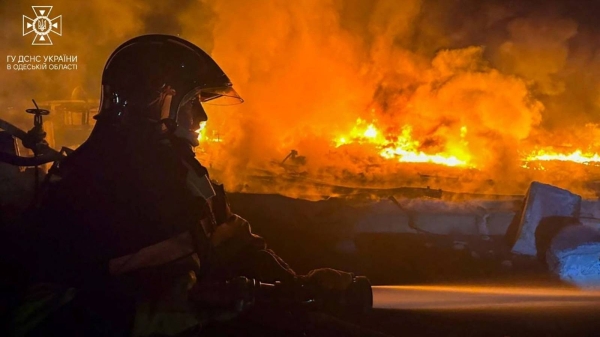
Although Russia provides military support to Bashar Assad and Turkey still calls for his ouster, Moscow and Ankara have been working closely on finding a peaceful solution to the Syrian conflict
Alongside Iran, Russia and Turkey have held talks under the Astana peace process launched last year
ANKARA/BEIRUT: Turkish President Recep Tayyip Erdogan said on Wednesday he would discuss Syria conflict flashpoints, in particular the situation in Daraa in the south and Idlib to the north, with Russian counterpart Vladimir Putin in South Africa this week.
Syrian regime forces launched an offensive last month backed by Russian planes to retake Daraa province in the south while the northwestern province of Idlib remains under the opposition control but at risk of a regime assault.
The Kremlin said Erdogan was due to meet Putin on Thursday on the sidelines of the annual BRICS summit of leading emerging economies Brazil, Russia, India, China and South Africa which the Turkish leader is also attending.
“There is the issue of Daraa, the most problematic. We will put this issue on our agenda again,” Erdogan told reporters at Ankara airport before he boarded the plane for Johannesburg, adding that Idlib would also be discussed.
“Because anything can happen in these places at any moment.”
Although Russia provides military support to Bashar Assad and Turkey still calls for his ouster, Moscow and Ankara have been working closely on finding a peaceful solution to the Syrian conflict.
Alongside Iran, Russia and Turkey have held talks under the Astana peace process launched last year and agreed to create four “de-escalation” zones to pave the way for a nationwide cease-fire. One of the zones is Idlib.
Then in January this year, Turkish forces supporting the Syrian opposition launched an offensive against the western enclave of Afrin, held by the Syrian Kurdish People’s Protection Units (YPG) militia. Afrin was captured in March.
Ankara says the YPG is linked to outlawed Kurdish insurgents inside Turkey.
“The developments in Syria — whether Tal Rifaat or Manbij — are not yet going in the desired direction,” Erdogan said, without giving details.
Manbij was held by the YPG but its fighters are now said to have withdrawn to avoid clashes with Turkey. Ankara was also troubled by the situation in the Syrian city of Tal Rifaat but Russia provided assurances the YPG were no longer present.
Kurds look to Damascus
Syria’s Kurds are trying to forge ties with Damascus as they seek to protect gains made in seven years of war, wary of its unpredictable US ally and more ready than ever to negotiate with Bashar Assad.
The main Kurdish groups have emerged among the few winners of the conflict in Syria, carving out autonomous rule over large parts of the north under the control of the Kurdish-led Syrian Democratic Forces (SDF) militia.
They have mostly avoided conflict with Assad, at times even fighting common foes. Talks between the Syrian Kurds and Damascus have now begun on a return of state employees and repairs to one of Syria"s most important pieces of infrastructure: The Tabqa Dam, the country’s largest, which the SDF took from Daesh last year with US air power.
A top Kurdish official has also signaled the fighters could join any future offensive against the opposition holding Idlib province.
A decision to stop calling their police force by its Kurdish name, “Asayish,” is another step that appears aimed at overhauling the region"s image with an eye to its future.
Syria’s Kurds, which the Baathist state systematically persecuted for years, say they do not seek independence, but they hope a political deal will safeguard their autonomy.
For the first time, Assad said in May he was “opening doors” for talks with the SDF, while also threatening force. A deal between them could settle the conflict in most of Syria.
But there is no sign of Damascus coming to the table yet.
US, France sanctions
The US has sanctioned eight people and five entities that helped form key parts of a procurement network for Syria’s chemical weapons program, US officials said on Wednesday.
The move, which comes as part of a coordinated action with France, targets the procurement network for Syria’s Scientific Studies and Research Center (SSRC), which the US Treasury Department said is the agency responsible for developing chemical weapons.
“Syria’s horrific use of chemical weapons, including attacks against innocent women and children, remains deeply embedded in our minds,” Sigal Mandelker, Treasury’s undersecretary for terrorism and financial intelligence, said in a statement.
“Today, we are continuing our campaign to stop the Assad regime’s ruthless attacks by targeting the procurement networks that have supported its chemical weapons program.”
France on Sunday renewed an asset freeze on 24 entities and individuals from the same network for providing an array of support to the SSRC, US officials said.
Among the entities targeted by Treasury sanctions are a Lebanon-based company called Electronics Katrangi Trading, which has operations in Syria, China, Egypt and France and “has provided, or attempted to provide, financial, material, technological, or other support for, or goods or services in support of, the SSRC.”
The sanctions also target Lebanon-based Top Technologies SARL, which specializes in the import and export of electronic components.











